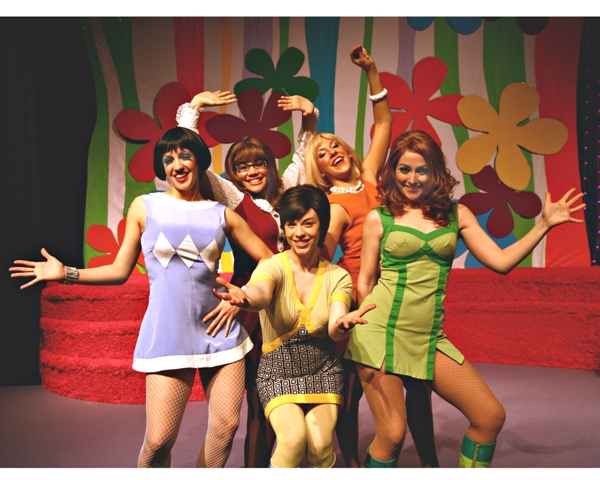Critical Analysis: Voiceovers as Oppression in SHOUT!
Critical Analysis: Voiceovers as Oppression in SHOUT!
 “England swings!” exclaim the women of the mod musical Shout!—named for the trendy mod magazine. The characters in this Phillip George, David Lowenstein, and Peter Charles Morris musical magazine struggle with what it means to be a woman in 1960s London—with the help of the pop hits of the decade. But while mod culture appears to liberate women with its emphasis on financial independence, Shout!’s use of voiceover suggests that in some ways, mod culture may have oppressed women instead.
“England swings!” exclaim the women of the mod musical Shout!—named for the trendy mod magazine. The characters in this Phillip George, David Lowenstein, and Peter Charles Morris musical magazine struggle with what it means to be a woman in 1960s London—with the help of the pop hits of the decade. But while mod culture appears to liberate women with its emphasis on financial independence, Shout!’s use of voiceover suggests that in some ways, mod culture may have oppressed women instead.
A major component of Shout! is the offstage character of Gwendolyn Holmes, an advice columnist for Shout! magazine. Periodically, one of the women recites a letter to Holmes, requesting help on issues ranging from how to tell if you’re actually in love to being in a physically abusive relationship. The advice their queries elicit is less than helpful, however, and is often not entirely relevant. “Perhaps you can clear up the confusion in your head by redoing what’s on your head,” Holmes’ voiceover suggests. “A new and becoming hairstyle might be just what you need to help you see your destiny clearly.” Holmes’ generic, fashion-and-marriage-cure-all approach to her readers’ problems not only fails to provide adequate advice; it also reinforces the traditional British values that mod culture claims to upend. Not once does Holmes mention anything remotely work or career oriented, nor does she have any words of support for single women. With increasing numbers of single young women in the workforce—many of whom dedicate their meager expendable incomes to fashionable clothes—commercialized mod culture, as depicted in Shout!, does not provide for the new needs of these women.
Instead of being a refuge for women the way an advice columnist can often be, this voiceover functions more like that in a commercial, offering a cosmetic solution to a problem. In one instance, the voiceover uses a character’s insecurity in her relationship to promote skin cream:
“Even in your 20s, you probably noticed that your skin is changing. But has HE noticed? Every day as you grow older your skin gradually gets thinner. And thinning skin is aging skin…The natural forces of gravity and time take hold of your face and pull it relentlessly down, down, down, towards an almost inevitable decay. But never fear! Ectocil Spantaneous Skin Cream can change all of that for you in only seventy-three nights…Don’t get old, get Ectocil. Because eventually, HE will notice.”
Here, the voiceover’s overwhelming message is that a woman’s appearance is vitally important in not just getting, but keeping a man. Later, as the women read outloud from the latest issue of Shout! magazine, the same character remarks, “I’m wearing Max Factor, Elizabeth Arden, Estee Lauder, Revlon and Dippity Doo. It takes three and a half hours to get ready, but when I’m done, you know what I’ve got? The natural look!” Even a self-possessed, capable woman such as this character puts landing a man at the center of her daily routine.
1960s London was a time of great advances for women’s liberation. With innovations in birth control and the high visibility of women in mod culture, London women found themselves with more options than ever before. But it’s not until the end of the show—and the decline of mod’s popularity—that a character in Shout! finally speaks her mind to Gwendolyn Holmes: “For years, I have allowed you to convince me that I am nothing but a gormless baby dispenser. No more…if your world of antiquated frippery weren’t already dying, I’d take a gun and shoot you dead.” At the dawn of the 1970s, the women of Shout! free themselves from voiceovers and start speaking for themselves.

To license SHOUT!--which is no longer a restricted title!--check out our MIT show page. To discuss this article or the show, post your thoughts in the forum on the SHOUT! ShowSpace page.
For more information about the show, visit the SHOUT! official website.
























